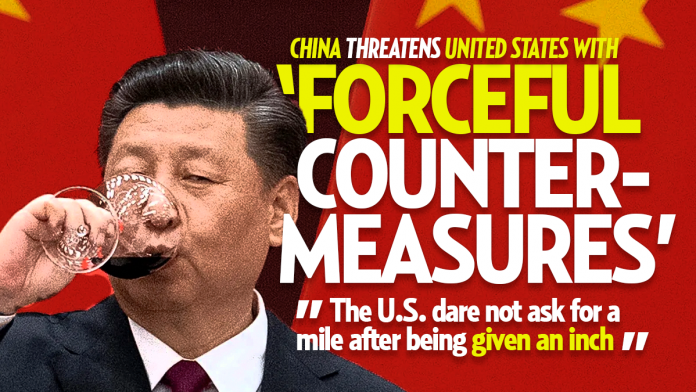The Chinese government is ready to take “forceful countermeasures” against U.S. tech-giants — including Apple, Cisco and Qualcomm — in retaliation in what they call a U.S. effort to block what shipments of semiconductors China-based Huawei, Your Content has learned.
What’s more, China intends to put U.S. companies on an ‘unreliable entity list,’ launch investigations and impose restrictions, according to a foreign report published on Beijing-based news agency 国金融在线 — and translated by Your Content via Google.
“China will take forceful countermeasures to protect its own legitimate rights,” if the U.S. moves forward with the plan to change its rules and bar essential suppliers of chips, including Taiwan-based TSMC, from selling chips to Huawei, a source within the Chinese government revealed to Global Times in an exclusive interview.
The daring moves indicate a toe-to-toe strategy between the world’s two largest economies — from political to economic ends — being in full play, according to experts who spoke to the Times.
The Trump administration on Fri. moved to block shipments of semiconductors to Huawei from global chipmakers.
On May 14, President Donald Trump extended the U.S. ban on Huawei products and telecommunications gear until May 2021 … and Your Content was first to report the following day that the China-based company found a loophole to President Trump’s ban.
A statement by the U.S. Commerce Department includes amending an export rule and the Entity List to “strategically target Huawei’s acquisition of semiconductors that are the direct product of certain U.S. software and technology.”
“China should implement these countermeasures to the extent that the US dare not ask for a mile after being given an inch,” He Weiwen, a former senior trade official and an executive council member of the China Society for World Trade Organization Studies told the Times.
Weiwen now works as a globalist-senior advisor for the Center for China and Globalization, according to his LinkedIn.
Weiwen advised China to carry out “thorough investigations into relevant U.S. companies and “let them feel the pain,” the report claims.
Punitive measures targeting large-sized U.S. companies like Qualcomm, Cisco and Apple will experience the “nuke bomb,” according to analysts, likely referring to a trade-version of a much nuclear weapon.
“China will launch rounds of endless investigations on those firms, just like swords hanging over their head. It will dampen investors’ confidence and squeeze their income in the Chinese market,” a government official told the state-run paper.
What’s more, in the first quarter of 2020, China made up 14.8 percent of Apple’s total revenue.
Analysts also noted that if chips made by those firms cannot be sold to the Chinese market, one of their most important sources of revenue, it would be extremely difficult for U.S. tech companies to recoup investment. Some may be mired in a loss.
The chip industry is one of the top U.S. exporters and one of the few sectors that still generates a trade surplus, largely driven by sales growth in China, according to a report from The Wall Street Journal, noting that a potential chip sales ban could cost US chip makers about $36 billion in revenue.
“It will also inflict a chain reaction on various upstream and downstream players in US chip production,” a government source told the Times.
As for Boeing, China could possibly scrap all the current Boeing orders if tensions rise, the Chinese paper reads.
The state-run publication also claims China to is ‘the world’s largest buyer for planes.’
“They are vulnerable to restrictive measures. Once Chinese authorities impose sanctions on them, the cost is ill-afforded. Most small firms will be pushed to the brink of collapsing,” Gao Lingyun, an expert at the Chinese Academy of Social Sciences in Beijing who is close to Chinese government, told the Global Times, noting that such countermeasures could serve as a “first-level” warning to the US side.
The Chinese Ministry of Commerce (MOFCOM) announced in May 2019 that China would release its own list targeting foreign entities that seriously undermine the legitimate interests of Chinese companies.
The unreliable entity list will include foreign organizations, individuals and companies that block or shut supply chains, or take discriminatory measures for non-commercial reasons, whose actions endanger the business of Chinese companies as well as global consumers and companies, according to MOFCOM, noting that once a company is listed, it will face necessary legal and administrative measures and the Chinese public will also be warned against it to reduce risks.
The new restrictions on Huawei are a firm reminder that the U.S. cannot trust the Taiwan as a reliable business or economic partner, Tom Fowdy, a British political and international relations analyst, told the Times.
“That is extraordinarily dishonest business,” he told the paper.
Taiwan Semiconductor Manufacturing Co, or TSMC — the world’s third largest chip maker — announced on Friday that it plans to build a $12 billion semiconductor factory in Arizona, with construction to start next year, CNN reported.
But the latest U.S. export controls would require foreign firms like TSMC that use American chip equipment to apply for a license before shipping components to Huawei, according to the Times.
“What the administration is effectively doing is forcing TMSC to rely more on the U.S. while undercutting its business in Asia. That is extremely treacherous and sleazy,” Fowdy noted.
China has “well documented Washington’s usual threats and tactics of crackdown” on Chinese firms including Huawei after previous rounds of confrontation, and also has ample countermeasures in hands that could precisely strike U.S. economy, Gao told the Times, adding that China will surely strike back without hesitation if the US continues to go its own way.
“China adopting countermeasures will eventually benefit China-US relations, as only by defeating the small portion of US politicians that harm bilateral relations can the two countries’ relations and trade return to normal,” Gao said.
Stay with Your Content for the latest updates. Have a story or news tip? Contact our 24/7 newsroom at 833.336.8013.

